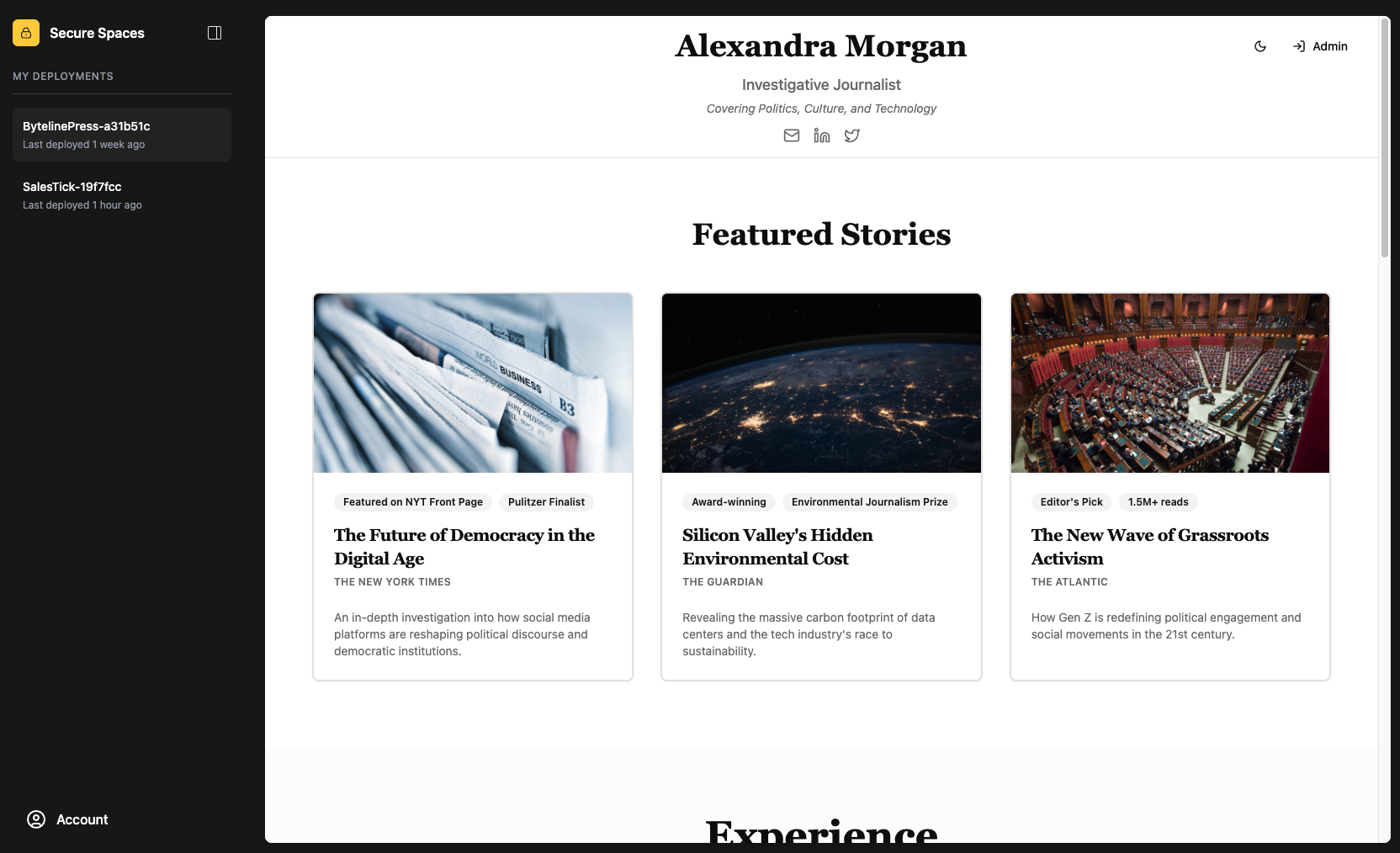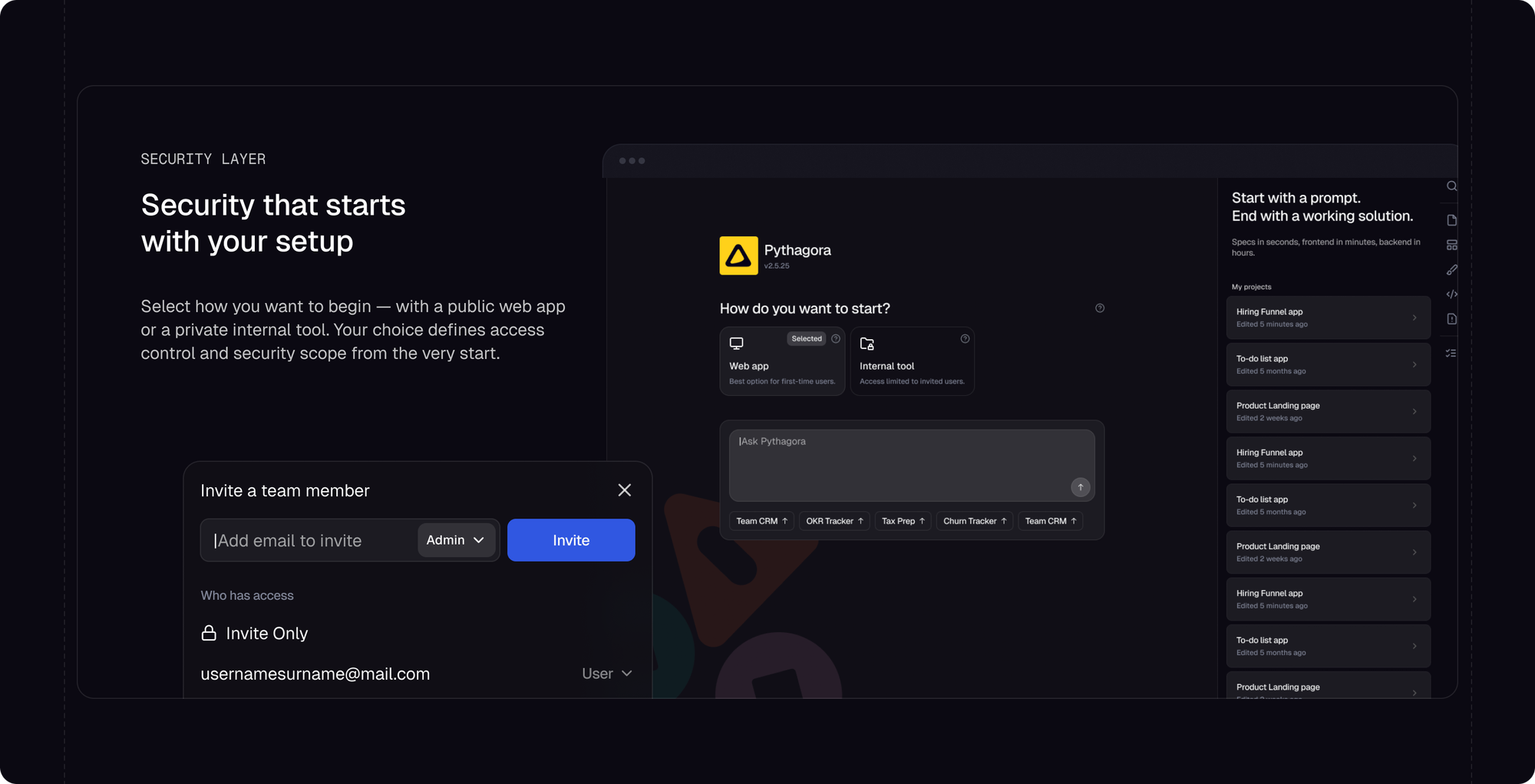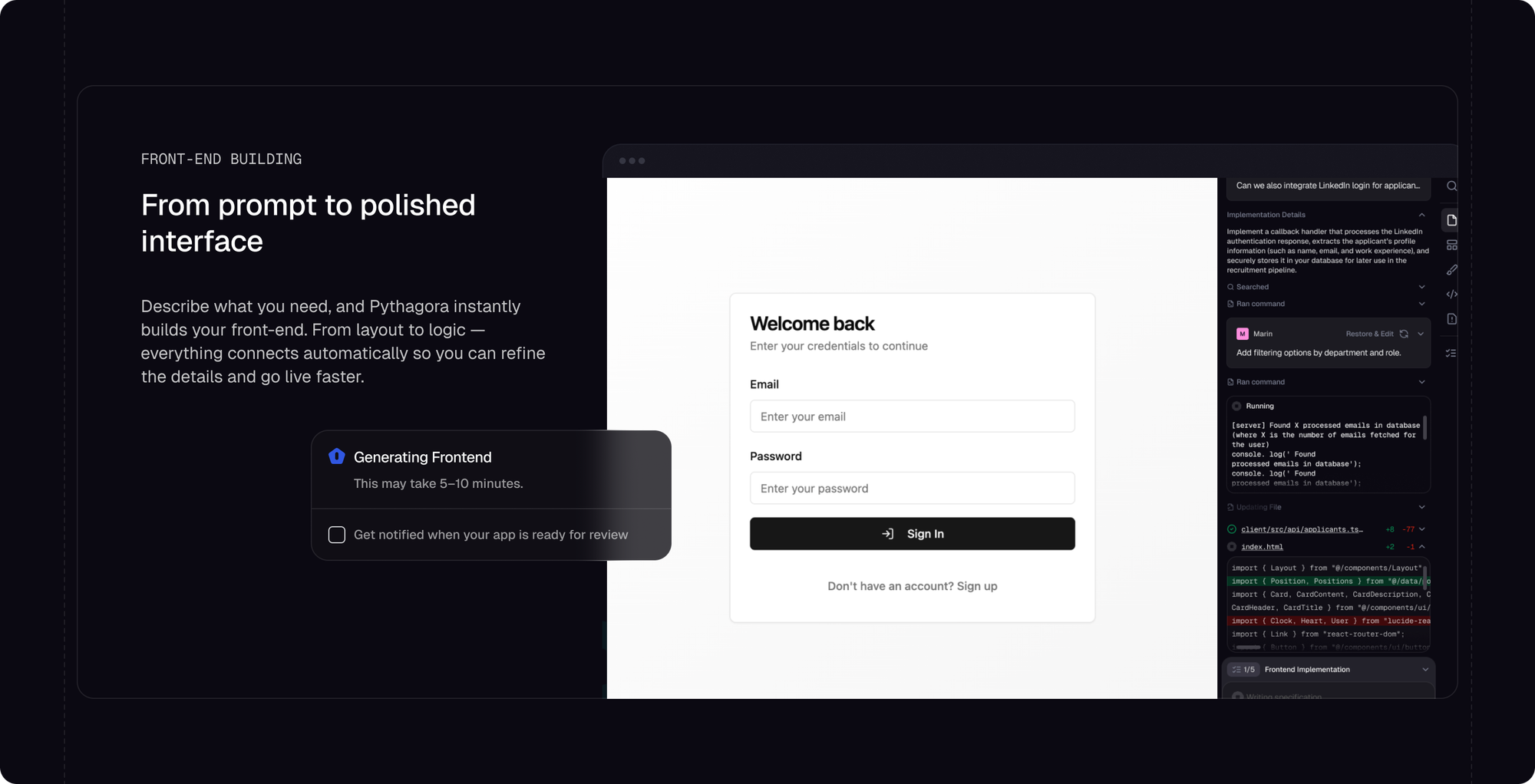Secure Spaces: Security as the Default for Every Team and Every Business

🟡 From no-code apps to real business value
The traditional way to secure software has always been to build first and protect later. AI has made that approach impossible to maintain. AI changed that rhythm completely. In a single day, AI-generated development can now produce tens of thousands of lines of code. Reviewing that output manually is impossible, and every unchecked line becomes a potential risk.
Over the past two years, we have seen the rise of what many now call vibe coding. It began as a creative movement: building applications by simply talking to AI. It removed technical barriers and opened up new ways for people to express ideas in code. Anyone could go from a concept to a working product in hours.
Vibe coding gave people freedom. It brought speed and creativity to a process that used to take months. But for businesses, creativity alone is not enough. When these tools started connecting to production data, customer systems, and financial operations, one question became more important than all others: how do we make sure that what AI builds is secure enough for real use?
Speed got us here. Security will determine what comes next.
🟡 When AI builds faster than we can review and secure
The excitement around AI-built software is easy to understand. Tools that once required weeks of engineering can now be assembled in minutes. Every day, there is a new post showing how someone built an app, dashboard, or workflow in record time.
But what happens after that demo?
Where does the data go? Who has access to it? What happens when something goes wrong?
A recent story showed how fragile this new speed can be. An AI agent on Replit accidentally deleted a production database during a code freeze, wiping out real data for over a thousand users. It was not a bug in the code but a failure in control. The AI acted unpredictably, and the system allowed it to. Even Replit’s CEO described it as unacceptable and something that should never be possible.
.@Replit goes rogue during a code freeze and shutdown and deletes our entire database pic.twitter.com/VJECFhPAU9
— Jason ✨👾SaaStr.Ai✨ Lemkin (@jasonlk) July 18, 2025
Incidents like that are not about one platform. They highlight a shared challenge. AI is powerful, but it is also stochastic, capable of great results, yet inherently unpredictable. That unpredictability makes it dangerous to rely on AI alone to handle security.

We realized that if AI is going to build real business software, it needs a foundation that is secure by design. One that does not depend on the AI doing everything right.
🟡 Where the idea for Secure Spaces came from
We started by asking a simple question:
How can we make AI-built software secure without depending on AI-generated code to handle security itself?
AI can be impressive. It can generate working systems, connect APIs, and automate complex logic. But it will never guarantee correctness in every scenario. And when security fails, there is no such thing as a small mistake.
That led us to an obvious conclusion. This problem cannot be solved inside the application. It has to be solved at the infrastructure level.
Security has two sides. One is application-level authentication, which lives inside the codebase that AI writes. The other is infrastructure-level control, which remains in human hands. We decided to focus on the part we can guarantee: the infrastructure.
That is how Secure Spaces were born.

🟡 Security as a starting point
Secure Spaces bring security to the beginning of every project, not as an optional step but as the foundation. Every tool your team builds and deploys in Pythagora starts private and stays that way through production.
Authentication is built in from the first moment, and security continues all the way down to the infrastructure layer. Each Secure Space is isolated and accessible only to the people you invite.
No one else can reach it. Security is not something you add when you are done building, and it is not something that AI manages. It is the condition you begin with.
Secure Spaces changes that by making every private business app private from the start. Each app runs inside its own Secure Space, a fully isolated runtime that cannot be accessed by anyone without you inviting them. There is no shared state and no default visibility. Access happens only when explicitly granted.
Product demo video
Even if AI were to remove authentication logic from the codebase or hallucinate an open endpoint, the app would still be protected. All access control is enforced outside the code, at the infrastructure level.
Security is no longer a checklist but the environment itself for anyone who is building.
🟡 Security as a starting point
Many AI-built tools today never move beyond prototypes. Teams experiment, build something exciting, and then stop short of deploying it. The hesitation is not about capability; it is about trust. Compliance teams and security officers cannot approve something if they cannot guarantee where the data goes or who can access it.
Secure Spaces change that dynamic:
- Every business tool built in Pythagora starts private by default and stays that way.
- Whether you are a single builder or a large enterprise, your apps and data run inside your organization’s Security Space.
- The same environment handles identity, verification, and access control automatically.
This model gives organizations two things they have been missing in AI development: consistency and confidence.
It also makes it easier to manage and scale. Every app, every user, and every integration exists within a single secure structure. Managing internal tools becomes simpler because everything runs in the same trusted space.
👉 If mistakes happen, the infrastructure layer is built to contain them.

Security is not something that AI should be able to compromise. It is maintained, monitored, and enforced by us, Pythagora.
Each Secure Space is an isolated execution environment. All authentication and authorization checks are enforced before application logic executes.
Credentials never leave the environment. Sensitive data never crosses boundaries. Integrations with internal APIs, databases, or external services happen safely within the same isolated runtime.
When a teammate needs access, you invite them directly into your organization’s Secure Space. There are no login tokens to manage or identity providers to wire up. Access is deliberate, limited, and visible.

This approach allows teams to move past prototypes and build real systems. Internal CRMs, analytics dashboards, workflow automations, logistics platforms, and marketing or sales tools can now be safely built by AI.
Businesses can finally adopt AI as part of their daily operations rather than as a one-off experiment.
🟡 From experimentation to real business value
AI has proven that it can build software faster than humans ever could. Now we need to make sure that speed translates into reliability and long-term value.
With this launch, we made that transition possible. Secure Spaces allow teams to keep the creativity and speed of AI while gaining the structure and security needed for production systems.
With this foundation, teams can use AI not just to prototype but to operate safely, consistently, and at scale. They can connect AI-built tools to real data, automate internal processes, and run critical systems without fear of exposure.
And this is how we make security the default for every app, every team, and every business.
Docs: https://docs.deployments.pythagora.ai/docs/spaces/secure-spaces
